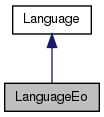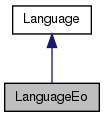Esperanto (Esperanto) More...


Public Member Functions | |
| checkTitleEncoding ($s) | |
| iconv ($in, $out, $string) | |
| Wrapper for charset conversions. | |
| initEncoding () | |
| strrtuxCallback ($matches) | |
| strrtxuCallback ($matches) | |
Detailed Description
Esperanto (Esperanto)
Definition at line 8 of file LanguageEo.php.
Member Function Documentation
- Parameters:
-
$s string
- Returns:
- string
Reimplemented from Language.
Definition at line 99 of file LanguageEo.php.
| LanguageEo::iconv | ( | $ | in, |
| $ | out, | ||
| $ | string | ||
| ) |
Wrapper for charset conversions.
In most languages, this calls through to standard system iconv(), but for Esperanto we're also adding a special pseudo-charset to convert accented characters to/from the ASCII-friendly "X" surrogate coding:
cx = ĉ cxx = cx gx = ĝ gxx = gx hx = ĥ hxx = hx jx = ĵ jxx = jx sx = ŝ sxx = sx ux = ŭ uxx = ux xx = x
http://en.wikipedia.org/wiki/Esperanto_orthography#X-system http://eo.wikipedia.org/wiki/X-sistemo
X-conversion is applied, in either direction, between "utf-8" and "x" charsets; this comes into effect when input is run through $wgRequest->getText() and the $wgEditEncoding is set to 'x'.
In the long run, this should be moved out of here and into the client-side editor behavior; the original server-side translation system dates to 2002-2003 when many browsers with really bad Unicode support were still in use.
- Parameters:
-
string $in input character set string $out output character set string $string text to be converted
- Returns:
- string
Reimplemented from Language.
Definition at line 40 of file LanguageEo.php.
Reimplemented from Language.
Definition at line 119 of file LanguageEo.php.
References $wgEditEncoding.
| LanguageEo::strrtuxCallback | ( | $ | matches | ) |
- Parameters:
-
$matches array
- Returns:
- string
Definition at line 58 of file LanguageEo.php.
References $matches.
| LanguageEo::strrtxuCallback | ( | $ | matches | ) |
- Parameters:
-
$matches array
- Returns:
- string
Definition at line 75 of file LanguageEo.php.
References $matches.
The documentation for this class was generated from the following file:
- languages/classes/LanguageEo.php
